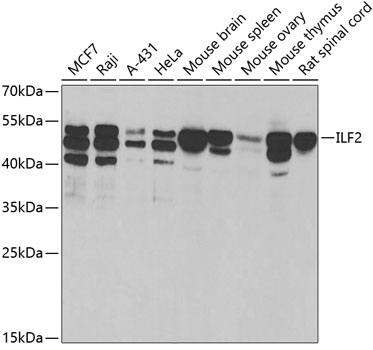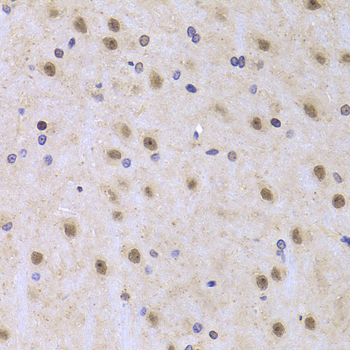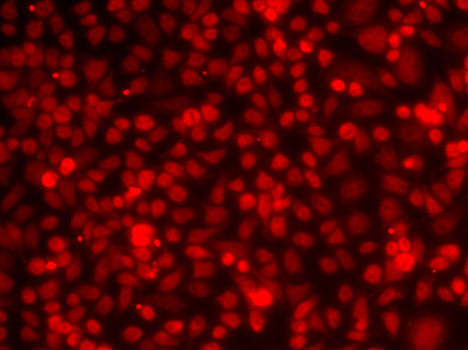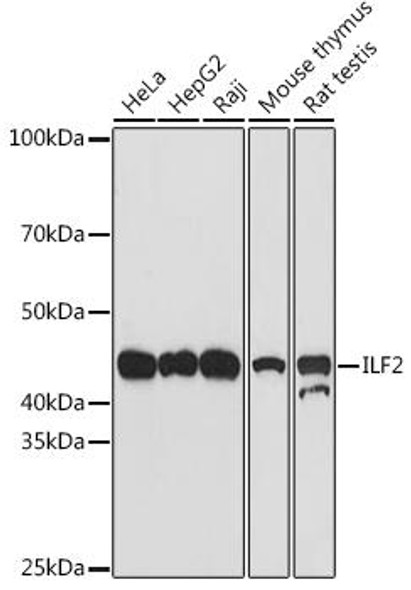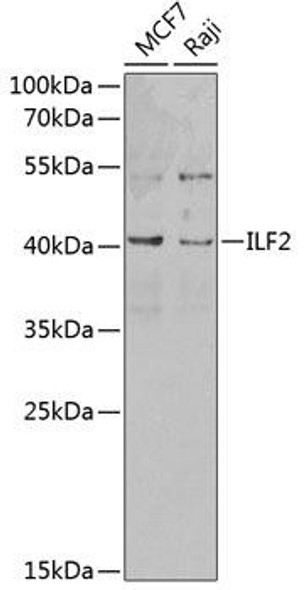Epigenetics & Nuclear Signaling Antibodies 2
Anti-ILF2 Antibody (CAB5882)
- SKU:
- CAB5882
- Product Type:
- Antibody
- Reactivity:
- Human
- Reactivity:
- Mouse
- Reactivity:
- Rat
- Host Species:
- Rabbit
- Isotype:
- IgG
- Antibody Type:
- Polyclonal Antibody
- Research Area:
- Epigenetics and Nuclear Signaling
Description
| Antibody Name: | Anti-ILF2 Antibody |
| Antibody SKU: | CAB5882 |
| Antibody Size: | 20uL, 50uL, 100uL |
| Application: | WB IHC IF |
| Reactivity: | Human, Mouse, Rat |
| Host Species: | Rabbit |
| Immunogen: | Recombinant fusion protein containing a sequence corresponding to amino acids 1-280 of human ILF2 (NP_004506.2). |
| Application: | WB IHC IF |
| Recommended Dilution: | WB 1:500 - 1:2000 IHC 1:50 - 1:200 IF 1:50 - 1:200 |
| Reactivity: | Human, Mouse, Rat |
| Positive Samples: | MCF7, Raji, A-431, HeLa, Mouse brain, Mouse spleen, Mouse ovary, Mouse thymus, Rat spinal cord |
| Immunogen: | Recombinant fusion protein containing a sequence corresponding to amino acids 1-280 of human ILF2 (NP_004506.2). |
| Purification Method: | Affinity purification |
| Storage Buffer: | Store at -20'C. Avoid freeze / thaw cycles. Buffer: PBS with 0.02% sodium azide, 50% glycerol, pH7.3. |
| Isotype: | IgG |
| Sequence: | MRGD RGRG RGGR FGSR GGPG GGFR PFVP HIPF DFYL CEMA FPRV KPAP DETS FSEA LLKR NQDL APNS AEQA SILS LVTK INNV IDNL IVAP GTFE VQIE EVRQ VGSY KKGT MTTG HNVA DLVV ILKI LPTL EAVA ALGN KVVE SLRA QDPS EVLT MLTN ETGF EISS SDAT VKIL ITTV PPNL RKLD PELH LDIK VLQS ALAA IRHA RWFE ENAS QSTV KVLI RLLK DLRI RFPG FEPL TPWI LDLL GHYA VMNN PTRQ PLAL NVAY RRCL QILA AGLF |
| Gene ID: | 3608 |
| Uniprot: | Q12905 |
| Cellular Location: | Cytoplasm, Nucleus, nucleolus |
| Calculated MW: | 43kDa |
| Observed MW: | 50kDa |
| Synonyms: | ILF2, NF45, PRO3063 |
| Background: | The protein encoded by this gene is a transcription factor required for T-cell expression of the interleukin 2 gene. It also binds RNA and is an essential component for encapsidation and protein priming of hepatitis B viral polymerase. The encoded 45 kDa protein (NF45, ILF2) forms a complex with the 90 kDa interleukin enhancer-binding factor 3 (NF90, ILF3), and this complex has been shown to affect the redistribution of nuclear mRNA to the cytoplasm, to repair DNA breaks by nonhomologous end joining, and to negatively regulate the microRNA processing pathway. Knockdown of NF45 or NF90 protein retards cell growth, possibly by inhibition of mRNA stabilization. Alternative splicing results in multiple transcript variants. Related pseudogenes have been found on chromosomes 3 and 14. |
| UniProt Protein Function: | ILF2: Appears to function predominantly as a heterodimeric complex with ILF3. This complex may regulate transcription of the IL2 gene during T-cell activation. It can also promote the formation of stable DNA-dependent protein kinase holoenzyme complexes on DNA. |
| UniProt Protein Details: | Protein type:RNA-binding; Transcription, coactivator/corepressor; Nucleolus Chromosomal Location of Human Ortholog: 1q21.3 Cellular Component: nucleoplasm; membrane; cytoplasm; nucleolus; ribonucleoprotein complex; nucleus Molecular Function:transferase activity; protein binding; DNA binding; double-stranded RNA binding; ATP binding Biological Process: transcription, DNA-dependent; positive regulation of transcription, DNA-dependent; immune response |
| NCBI Summary: | The protein encoded by this gene is a transcription factor required for T-cell expression of the interleukin 2 gene. It also binds RNA and is an essential component for encapsidation and protein priming of hepatitis B viral polymerase. The encoded 45 kDa protein (NF45, ILF2) forms a complex with the 90 kDa interleukin enhancer-binding factor 3 (NF90, ILF3), and this complex has been shown to affect the redistribution of nuclear mRNA to the cytoplasm, to repair DNA breaks by nonhomologous end joining, and to negatively regulate the microRNA processing pathway. Knockdown of NF45 or NF90 protein retards cell growth, possibly by inhibition of mRNA stabilization. Alternative splicing results in multiple transcript variants. Related pseudogenes have been found on chromosomes 3 and 14. [provided by RefSeq, Dec 2014] |
| UniProt Code: | Q12905 |
| NCBI GenInfo Identifier: | 62510764 |
| NCBI Gene ID: | 3608 |
| NCBI Accession: | Q12905.2 |
| UniProt Secondary Accession: | Q12905,Q5SR10, Q5SR11, Q7L7R3, Q9BWD4, Q9P1N0, A6NDB0 B2R8G7, |
| UniProt Related Accession: | Q12905 |
| Molecular Weight: | 390 |
| NCBI Full Name: | Interleukin enhancer-binding factor 2 |
| NCBI Synonym Full Names: | interleukin enhancer binding factor 2 |
| NCBI Official Symbol: | ILF2 |
| NCBI Official Synonym Symbols: | NF45; PRO3063 |
| NCBI Protein Information: | interleukin enhancer-binding factor 2; interleukin enhancer binding factor 2, 45kD; nuclear factor of activated T-cells, 45-kDa; interleukin enhancer binding factor 2, 45kDa |
| UniProt Protein Name: | Interleukin enhancer-binding factor 2 |
| UniProt Synonym Protein Names: | Nuclear factor of activated T-cells 45 kDa |
| Protein Family: | Interleukin enhancer-binding factor |
| UniProt Gene Name: | ILF2 |
| UniProt Entry Name: | ILF2_HUMAN |
View AllClose


